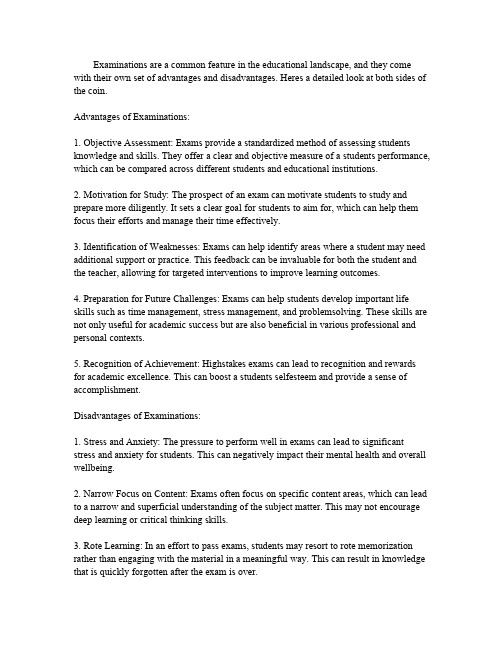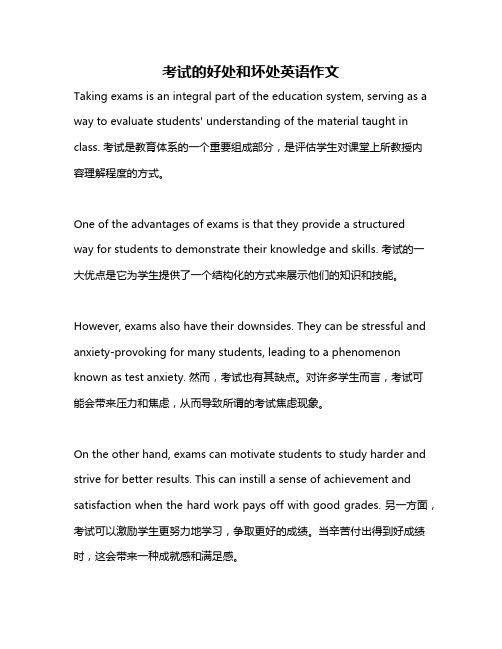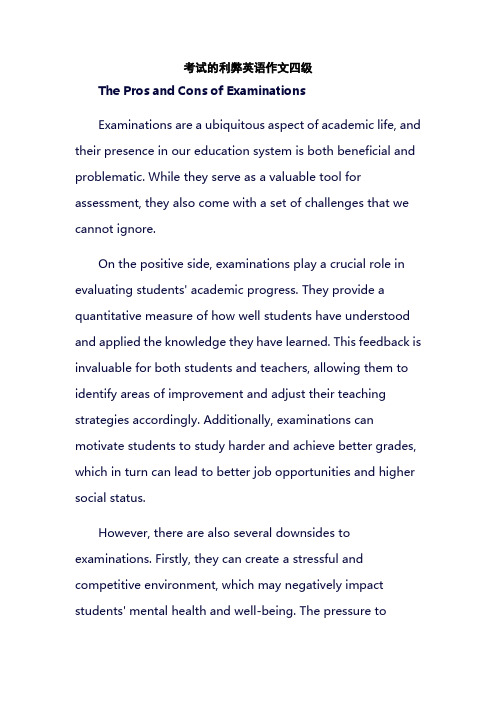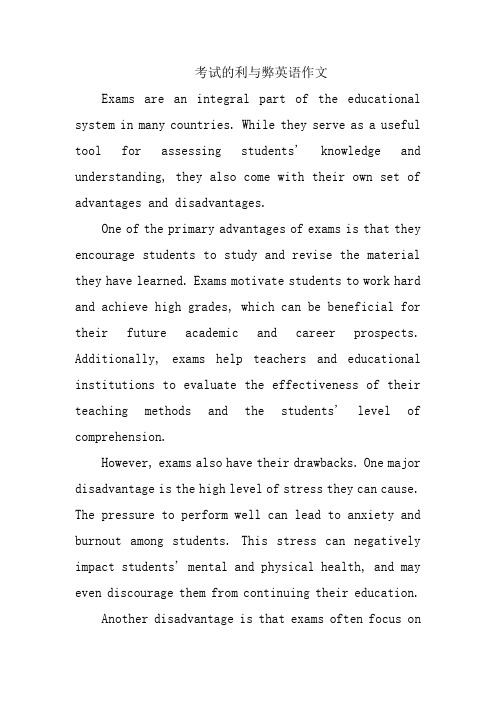关于考试制度利弊的英语文章
考试利弊英语作文

考试利弊英语作文Examination: A Double-Edged SwordIntroductionExaminations have long been a staple of the education system, serving as a method to assess a student's knowledge and understanding of a particular subject. However, the impact of examinations extends far beyond the classroom, influencing a student's future prospects and shaping the educational landscape. This essaywill delve into the multifaceted nature of examinations, exploring the historical context, various perspectives, case studies, and a critical evaluation of the benefits and drawbacks. Furthermore, it will conclude with recommendations for the future implications of examinations in the realm of education.Historical BackgroundThe concept of examinations can be traced back to ancient China, where the imperial examination system was established during the Sui dynasty in 605 AD. This system was designed to select candidates for the state bureaucracy based on their knowledge of Confucian classics. The examination system was later adopted by other East Asian countries, such as Korea and Japan, and eventually made its way to the Western world. Over time, examinations have evolved to encompass a wide range of formats, from standardized tests to essay-based assessments, reflecting the changing needs of education systems worldwide.Perspectives and OpinionsThe topic of examinations elicits a myriad of perspectives and opinions, with proponents arguing that examinations provide a fair and objective measure of a student's abilities. They believe that examinations motivate students to study and perform to the best of their abilities, fostering a competitive spirit and a strong work ethic. Additionally, examinations serve as a benchmark for academicstandards, ensuring that students meet the necessary requirements for progression to higher levels of education or entry into the workforce.On the other hand, critics argue that examinations place undue stress on students, leading to anxiety, mental health issues, and a narrow focus on rote memorization rather than holistic learning. They contend that examinations fail to capture the full spectrum of a student's capabilities, neglecting important skills such as critical thinking, creativity, and emotional intelligence. Furthermore, the emphasis on high-stakes examinations can perpetuate inequality, as students from disadvantaged backgrounds may not have access to the resources needed to excel in such settings.Case Studies and ExamplesTo illustrate the impact of examinations, we can look at the case of South Korea, where the hyper-competitive education system places a heavy emphasis on standardized tests. The intense pressure to perform well on examinations has led to a phenomenon known as 'education fever,' where students undergo grueling study schedules and attend additional cram schools to gain a competitive edge. This has raised concerns about the well-being of students and the narrow focus on academic achievement at the expense of personal development.Conversely, Finland has garnered attention for its progressive approach to education, which minimizes the role of high-stakes examinations. Instead, the Finnish education system focuses on holistic learning, personalized teaching, and a strong emphasis on student well-being. This has resulted in consistently high levels of student satisfaction and academic performance, challenging the notion that examinations are indispensable for educational success.Critical EvaluationExaminations undoubtedly serve as a valuable tool for assessing student knowledge and maintaining academic standards. They provide a tangible measure of achievement and can incentivize students to strive for excellence. However, thedrawbacks of examinations cannot be overlooked. The intense pressure to perform well can have detrimental effects on students' mental health, and the narrow focus on examinable content may hinder the development of essential skills for the modern world.Future Implications and RecommendationsAs we look to the future, it is imperative to strike a balance between the benefits and drawbacks of examinations. One potential avenue for improvement is to diversify assessment methods, incorporating project-based assessments, presentations, and portfolios to provide a more comprehensive evaluation of student abilities. Additionally, a greater emphasis on student well-being and mental health support can help mitigate the negative effects of high-stakes examinations. Ultimately, the goal should be to create an educational environment that fosters holistic development, equipping students with the skills and knowledge needed to thrive in an ever-changing world.In conclusion, examinations are a double-edged sword, with both benefits and drawbacks that must be carefully considered. By acknowledging the historical context, analyzing various perspectives, and critically evaluating the impact of examinations, we can work towards a more balanced and effective approach to assessment in education. It is only through thoughtful consideration and proactive measures that we can ensure examinations serve as a positive force in shaping the future of education.。
考试的利弊英语作文

Examinations are a common feature in the educational landscape,and they come with their own set of advantages and disadvantages.Heres a detailed look at both sides of the coin.Advantages of Examinations:1.Objective Assessment:Exams provide a standardized method of assessing students knowledge and skills.They offer a clear and objective measure of a students performance, which can be compared across different students and educational institutions.2.Motivation for Study:The prospect of an exam can motivate students to study and prepare more diligently.It sets a clear goal for students to aim for,which can help them focus their efforts and manage their time effectively.3.Identification of Weaknesses:Exams can help identify areas where a student may need additional support or practice.This feedback can be invaluable for both the student and the teacher,allowing for targeted interventions to improve learning outcomes.4.Preparation for Future Challenges:Exams can help students develop important life skills such as time management,stress management,and problemsolving.These skills are not only useful for academic success but are also beneficial in various professional and personal contexts.5.Recognition of Achievement:Highstakes exams can lead to recognition and rewards for academic excellence.This can boost a students selfesteem and provide a sense of accomplishment.Disadvantages of Examinations:1.Stress and Anxiety:The pressure to perform well in exams can lead to significant stress and anxiety for students.This can negatively impact their mental health and overall wellbeing.2.Narrow Focus on Content:Exams often focus on specific content areas,which can lead to a narrow and superficial understanding of the subject matter.This may not encourage deep learning or critical thinking skills.3.Rote Learning:In an effort to pass exams,students may resort to rote memorization rather than engaging with the material in a meaningful way.This can result in knowledge that is quickly forgotten after the exam is over.4.Inequality in Assessment:Exams may not be an accurate reflection of a students true abilities,as they can be influenced by factors such as socioeconomic background,access to resources,and even the students state of health on the day of the exam.5.Limitation of Creativity:The structured nature of exams can stifle creativity and original thought.Students may feel compelled to conform to a specific answer or way of thinking,which can limit their ability to express their unique perspectives.6.Overemphasis on Quantitative Measures:The reliance on exams can lead to an overemphasis on quantitative measures of success,such as grades and scores,rather than a more holistic approach to education that values personal growth and development.In conclusion,while examinations serve important purposes in the educational system, they also have significant drawbacks.It is essential for educators to consider these factors when designing assessment strategies,aiming for a balance that promotes learning and development without causing undue stress or limiting students potential.。
考试的好处和坏处英语作文

考试的好处和坏处英语作文Taking exams is an integral part of the education system, serving as a way to evaluate students' understanding of the material taught in class. 考试是教育体系的一个重要组成部分,是评估学生对课堂上所教授内容理解程度的方式。
One of the advantages of exams is that they provide a structuredway for students to demonstrate their knowledge and skills. 考试的一大优点是它为学生提供了一个结构化的方式来展示他们的知识和技能。
However, exams also have their downsides. They can be stressful and anxiety-provoking for many students, leading to a phenomenon known as test anxiety. 然而,考试也有其缺点。
对许多学生而言,考试可能会带来压力和焦虑,从而导致所谓的考试焦虑现象。
On the other hand, exams can motivate students to study harder and strive for better results. This can instill a sense of achievement and satisfaction when the hard work pays off with good grades. 另一方面,考试可以激励学生更努力地学习,争取更好的成绩。
当辛苦付出得到好成绩时,这会带来一种成就感和满足感。
Furthermore, exams are a way for teachers to assess their teaching methods and the effectiveness of their instruction. They can use exam results to identify areas where students are struggling and adjust their teaching strategies accordingly. 此外,考试也是教师评估自己教学方法及教学效果的一种方式。
考试是利大于弊英语作文

考试是利大于弊英语作文Well, exams can be really stressful, but I thinkthey're more helpful than harmful. I mean, they make you study and learn the material, right? Without exams, I'd probably just procrastinate and not bother to really understand the stuff.But yeah, I get that exams can be nerve-wracking. I mean, all that pressure to perform well and the fear of failure can really mess with your head. It's like, you study and study, and then you get in there and your mind goes blank. It's rough.On the other hand, exams do help you see where you stand. Like, they show you what you've mastered and what you still need to work on. It's a reality check, you know? And that can be a good thing, because then you know what to focus on.Of course, there's the argument that exams don't reallymeasure your true abilities. I mean, some people just don't perform well under that kind of pressure, and it doesn't mean they're not smart or capable. So, I guess exams aren't perfect, but they do serve a purpose.And let's not forget, exams are kind of like a challenge. You get in there and you're like, "Okay, let's see what I can do." It's a chance to show what you've learned and how far you've come. And that feeling of accomplishment when you ace an exam? It's pretty great. So, yeah, exams have their downsides, but I think the benefits outweigh the drawbacks.。
科举的利弊英文作文

科举的利弊英文作文英文:The imperial examination system, or keju in Chinese, was a method of selecting officials for the state bureaucracy in imperial China. It had both advantages and disadvantages.One of the benefits of the imperial examination system was that it provided an opportunity for social mobility. In theory, anyone, regardless of their social status, could take the exams and become an official. This meant that individuals from humble backgrounds had the chance to improve their social standing and contribute to the government. For example, my great-grandfather was a farmer, but he studied hard and passed the imperial examination, eventually becoming a respected government official.Another advantage of the keju system was that it promoted meritocracy. Officials were selected based ontheir knowledge of Confucian classics and literary skills, rather than their family background or wealth. This helped to ensure that individuals with the most talent and ability were chosen to serve the government. As a result, the bureaucracy was often staffed by highly educated and capable individuals who were dedicated to their duties.However, the imperial examination system also had its drawbacks. One of the main criticisms of the keju system was that it placed too much emphasis on rote memorization and literary skills, rather than practical knowledge orreal-world experience. This meant that some officials lacked the practical skills necessary to effectively govern and administer the country. For instance, my uncle, who passed the exams with flying colors, struggled to manage his local district due to his lack of practical experience.Furthermore, the keju system also perpetuated a rigid social hierarchy. While it did offer a path to social mobility for some, the majority of successful candidates came from elite families with the resources to supporttheir education. This meant that the system did little tochallenge the existing social order and often reinforced the power of the privileged class.In conclusion, the imperial examination system had both advantages and disadvantages. While it provided opportunities for social mobility and promoted meritocracy, it also placed too much emphasis on rote memorization and perpetuated a rigid social hierarchy.中文:科举制度,或称科举,是中国古代选拔官员的一种方法。
考试的利弊英语作文四级

考试的利弊英语作文四级The Pros and Cons of ExaminationsExaminations are a ubiquitous aspect of academic life, and their presence in our education system is both beneficial and problematic. While they serve as a valuable tool for assessment, they also come with a set of challenges that we cannot ignore.On the positive side, examinations play a crucial role in evaluating students' academic progress. They provide a quantitative measure of how well students have understood and applied the knowledge they have learned. This feedback is invaluable for both students and teachers, allowing them to identify areas of improvement and adjust their teaching strategies accordingly. Additionally, examinations can motivate students to study harder and achieve better grades, which in turn can lead to better job opportunities and higher social status.However, there are also several downsides to examinations. Firstly, they can create a stressful and competitive environment, which may negatively impact students' mental health and well-being. The pressure toperform well in examinations can lead to anxiety, depression, and even cheating behavior. Secondly, examinations often focus on rote memorization rather than critical thinking and problem-solving skills. This can discourage students from developing a deeper understanding of the subject matter and limit their ability to apply knowledge in real-world situations.Furthermore, examinations may not always accurately reflect students' abilities and potential. Some students may excel in examinations due to their memory skills or test-taking strategies, while others may be better suited for hands-on learning or project-based assessment. Relying solely on examinations as a measure of academic achievement can therefore be unfair and limit the opportunities for students to demonstrate their true capabilities.In conclusion, while examinations serve an important role in the education system, we must also be aware of their limitations and potential negative impacts. A balanced approach that combines examinations with other forms of assessment, such as projects, presentations, and portfolios, can help us to better evaluate students' academic progress and potential.。
科举的利弊英文作文带翻译

科举的利弊英文作文带翻译"英文,"The imperial examination system, also known as thecivil service examination, was a method of recruiting officials for the government in imperial China. It had both its advantages and disadvantages.One of the benefits of the imperial examination system was that it provided an opportunity for social mobility. In traditional Chinese society, social status was largely determined by birth, and the imperial examination system offered a way for talented individuals from lower social classes to rise to positions of power and influence. For example, my great-grandfather was born into a poor farming family, but he was able to pass the imperial examination and become a respected government official.Another advantage of the imperial examination system was that it promoted meritocracy. Instead of relying onfamily connections or wealth, individuals were able to advance in society based on their intellectual abilitiesand knowledge. This helped to ensure that the mostqualified individuals were placed in positions of authority, leading to a more efficient and fair government.However, the imperial examination system also had its drawbacks. One of the main criticisms of the system wasthat it placed too much emphasis on rote memorization and test-taking skills, rather than practical knowledge or critical thinking. As a result, some scholars and officials were more focused on passing the exams rather than truly understanding the subjects they were studying. This could lead to a lack of innovation and creativity in government policies and administration.Another disadvantage of the imperial examination system was that it created a highly competitive and stressful environment for students. The intense pressure to succeedin the exams could take a toll on individuals' mental and physical well-being. I have a friend who suffered from severe anxiety and depression while preparing for theimperial examination, which ultimately affected his performance in the exams.In conclusion, while the imperial examination systemhad its benefits in promoting social mobility and meritocracy, it also had significant drawbacks in terms of promoting rote memorization and creating a stressful environment for students."中文,"科举制度,也称为科举考试,是中国古代招募官员的一种方法。
考试的利与弊英语作文

考试的利与弊英语作文Exams are an integral part of the educational system in many countries. While they serve as a useful tool for assessing students' knowledge and understanding, they also come with their own set of advantages and disadvantages.One of the primary advantages of exams is that they encourage students to study and revise the material they have learned. Exams motivate students to work hard and achieve high grades, which can be beneficial for their future academic and career prospects. Additionally, exams help teachers and educational institutions to evaluate the effectiveness of their teaching methods and the students' level of comprehension.However, exams also have their drawbacks. One major disadvantage is the high level of stress they can cause. The pressure to perform well can lead to anxiety and burnout among students. This stress can negatively impact students' mental and physical health, and may even discourage them from continuing their education.Another disadvantage is that exams often focus onrote memorization rather than on the application of knowledge. This can lead to a superficial understanding of the subject matter, where students may memorize information just for the sake of passing the exam without truly grasping the concepts.Furthermore, exams do not always accurately reflect a student's abilities or potential. Factors such as test anxiety, personal circumstances, and even luck can affect the outcome of an exam, which may not be a true indication of a student's intelligence or capabilities.In conclusion, while exams have their merits in assessing student performance and improving educational quality, they also pose challenges that need to be addressed. It is important for educational systems to find a balance between using exams as a tool for assessment and ensuring that they do not become a source of undue stress or a barrier to true learning.中文翻译:考试在许多国家的教育体系中是一个不可或缺的部分。
- 1、下载文档前请自行甄别文档内容的完整性,平台不提供额外的编辑、内容补充、找答案等附加服务。
- 2、"仅部分预览"的文档,不可在线预览部分如存在完整性等问题,可反馈申请退款(可完整预览的文档不适用该条件!)。
- 3、如文档侵犯您的权益,请联系客服反馈,我们会尽快为您处理(人工客服工作时间:9:00-18:30)。
关于考试制度利弊的英语文章Examination is the most familiar word to the students for we all need to face it. Each existence has its own reason. The exam which has existed for long time also has its advantages. Firstly, it can check how much or how hard you learned in this period of time. This can make you learn more about the study situation of yourself. Secondly, you can see some defects via the exam. Then you can decide how to correct them. Meanwhile, exam also has some disadvantages. Some schools take too much exam even makes it as a burden to the students. If teachers and parents regard the exam as the most important thing, the students would feel stressful. These maybes lead to cheating.
So, we should take the appropriate attitude towards the examination. If everyone does so, exams will no more scare. 考试是最熟悉的词来让学生们为我们都需要面对它.每个存在有它自己的理由.考试中已经存在了很长时间也有它的优点.首先,它可以检查有多少或你怎样努力学的这段时间.这能使你更了解自己的学习情况.其次,你可以看到一些缺陷通过考试.然后你可以决定如何改正.
与此同时,考试也有一些缺点.一些学校采取太多的考试甚至把自己当作负担的学生.如果老师和家长们认为这个考试是最重要的,学生们会
感到压力.这些找出导致作弊.
所以,我们应该采取相应的考试的态度.如果每个人都这样做,考试就没有更多的恐慌.
-----------------chddh--华丽丽的分割线------------------ Students’Rating of Their Teachers Nowadays, it has become as common in colleges and universities for students to grade teachers as for teachers to grade students. In some universities students’rating has even become the only source of information on teaching effectiveness.. This, however, has caused great controversy. Some are in favor of the rating system, They hold that since students attend the teachers’classes every day, they should have their opinion about their teachers’effectiveness. Others, on the contrary, are strongly against it. They believe that there is much more to teaching than what is shown on students’rating forms. Students should not be expected to judge whether the materials they use are up to date or how well the teacher knows about the subject. These judgments require professional knowledge, which is best left for the teachers’colleagues. I think students’rating of their teachers is necessary, but it should be conducted in a way that can really shed meaningful light on teachers’performance. Instead of rating the teachers’
knowledge on the subject, students should be asked to estimate what they have learned in a course, and to report on such things as a teacher’s ability to communicate with students, his or her relationship with students, and his or her ability to arouse students’interest in the subject.
来源网络搜集整理,仅作为学习参考,请按实际情况需要自行编辑。
